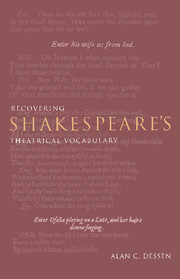Book contents
- Frontmatter
- Contents
- Preface
- Note on texts and old spelling
- 1 The problem, the evidence, and the language barrier
- 2 Lost in translation
- 3 Interpreting without a dictionary
- 4 Juxtapositions
- 5 Theatrical italics
- 6 Sick chairs and sick thrones
- 7 Much virtue in as
- 8 The vocabulary of “place”
- 9 “Romeo opens the tomb”
- 10 Vanish and vanishing
- Conclusion: So what?
- Notes
- Plays and editions cited
- Index
1 - The problem, the evidence, and the language barrier
Published online by Cambridge University Press: 07 May 2010
- Frontmatter
- Contents
- Preface
- Note on texts and old spelling
- 1 The problem, the evidence, and the language barrier
- 2 Lost in translation
- 3 Interpreting without a dictionary
- 4 Juxtapositions
- 5 Theatrical italics
- 6 Sick chairs and sick thrones
- 7 Much virtue in as
- 8 The vocabulary of “place”
- 9 “Romeo opens the tomb”
- 10 Vanish and vanishing
- Conclusion: So what?
- Notes
- Plays and editions cited
- Index
Summary
“You speak a language that I understand not”
The Winter's Tale, 3.2.79The terms invoked in this book's title trail with them various problems. To concentrate upon recovering X from the past, especially the theatrical past, is to set in motion a process that makes some readers and many theatrical professionals uncomfortable, even hostile. Admittedly, historically oriented scholars attuned to such disciplines as philology, iconography, and “ideas-of-the-time” contextual interpretation will find my goals and methods familiar, even self-evident. Such scholars will agree with John Shearman who, in his study of Mannerism, notes that “contemporary standards” of our age not only “do not give the right guidance to understanding a past age” but, in fact, can be “a positive hindrance.” Rather, he argues: “In decoding messages from the other side we get more meaningful results if we use their code rather than ours,” for “wherever possible a work of art should be interpreted by throwing it back into the nest of ideas in which it was born.”
As practiced for several generations, however, the invocation and application of a Renaissance “nest of ideas” or “code” in Shakespeare studies has led to many oversimplified formulations and interpretations, so that post-structuralists attuned to indeterminacy, free play, and the death of the author may understandably be dubious when confronted with claims about “recovery.”
- Type
- Chapter
- Information
- Recovering Shakespeare's Theatrical Vocabulary , pp. 1 - 18Publisher: Cambridge University PressPrint publication year: 1995



